Alam Ara
Alam Ara (transl. The Ornament of the World) was a 1931 Indian[2][3] film directed by Ardeshir Irani. It was the first Indian sound film.[4][5]
| Alam Ara | |
|---|---|
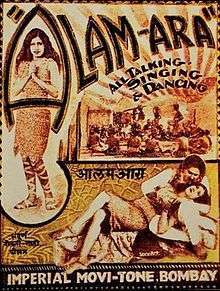 Theatrical release poster | |
| Directed by | Ardeshir Irani |
| Produced by | Imperial Movietone |
| Written by | Joseph David Penkar Munshi Zaheer |
| Starring | Master Vithal Zubeida Prithviraj Jilloobai |
| Music by | Ferozshah M. Mistri B. Irani |
| Cinematography | Wilford Deming Adi M. Irani |
| Edited by | Ezra Mir |
Release date | 14 March 1931 |
Running time | 124 minutes |
| Country | India |
| Language | Hindi-Urdu[1] |
| Budget | ₹390 million (US$5.5 million)(Adjusted) |
| Box office | ₹2.89 billion (US$41 million) (Adjusted)
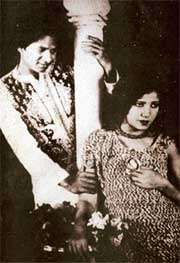 Master Vithal and Zubeida in Alam Ara, 1931. |
Irani recognised the importance that sound would have on the cinema, and raced to complete Alam Ara before several contemporary sound films. Alam Ara debuted at the Majestic Cinema in Mumbai (then Bombay) on 14 March 1931.[6] The first Indian talkie was so popular that "police aid had to be summoned to control the crowds."[7] The film was houseful for the next 8 weeks of its release. It was advertised with the tagline "All living. Breathing. 100 per cent talking".[8]
The film has long been lost and was not available as far back as 1967 according to the National Film Archive of India, Pune.[9]
Plot
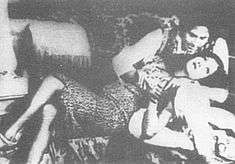
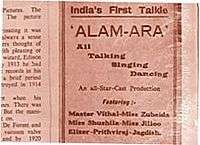
The film is a love story between a prince and a gypsy girl, based on a traditional Parsi play with a script written by the Bene Israel of India member, Joseph David Penkar. David later served as a writer at Irani's film company. The story centers on an imaginary, historical royal family in the kingdom of Kumarpur. The main characters are the king, Sultan Saleem Khan (L. V. Prasad), and his two warring wives, Dilbahar Begum (Shushila), and Navbahar Begum (Zillu). Their rivalry escalates when a fakir (W. M. Khan) predicts that Navbahar will bear the king's heir.
Dilbahar, in a fit, attempts to have an affair with the kingdom's chief minister, General Adil Khan (Prithviraj). The affair goes sour and a vengeful Dilbahar imprisons him and exiles his daughter, Alam Ara or Alamara (Zubeida). In exile, Alamara is brought up by Gypsies. Upon returning to the palace at Kumarpur, Alamara meets and falls in love with the charming young prince, Jahangir Khan (Master Vithal). In the end, Adil is released, Dilbahar is punished and the lovers marry.
Cast
- Master Vithal as Adil Jahangir Khan
- Zubeida as Alamara
- Zillu as Navbahar
- Shushila as Dilbahar
- Prithviraj as General Adil Khan
- Elizer as Badshah
- Sakhu[10]
- Wazir Mohammed Khan as Fakir
- Jagdish as Rustom
- L. V. Prasad as Sultan Saleem Khan
Significance
Both the movie and its music were widely successful,[11] including the hit song "De de khuda ke naam per", which was also the first song of the Indian cinema. It was sung by actor Wazir Mohammed Khan who played a fakir in the film.[11][12] As playback singing had yet to start in Indian cinema, it was recorded live with musical accompaniment of a harmonium and a tabla.[13][14]
Production
In 1929 Irani was prompted to make India’s first talking and singing film after he saw the part-talkie American film Show Boat (1929). At that time, there were no soundproof stages and technicians were unaware of how to make a film that had sound.[15] He then decided to make a screen version of a popular stage play written by Joseph David, who agreed to adapt the play for the silver screen. Irani handled the sound recording department, using the Tanar Sound System. It was shot with the Tanar single-system camera, which recorded sound directly onto the film.[11]
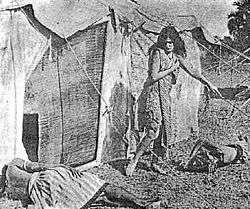
The film was mostly shot at night, between 1am and 4am with microphones hidden near the actors. The studio was near the railway tracks, and the noise of the trains disturbed the shooting during the day.[15] Since Alam Ara was the first Indian sound film, the makers needed actors who knew the language. Ruby Myers was considered for the title character but Zubeida was cast instead. It was because Ruby Myers was an Iraqi Jew and was not fluent in Urdu or Hindustani language.[15] The then newcomer Mehboob Khan, who later went on to make Mother India (1957), was considered for the male lead. But, they decided to cast a more commercially viable actor and chose actor-stuntman Master Vithal.[15]
Soundtrack
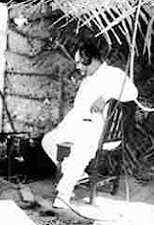
The film had music by Ferozshah M. Mistri and B. Irani, and had seven songs. The songs were in the Hindustani language, primarily the Urdu dialect. It was the first filmi Bollywood music soundtrack, and the first in the filmi-ghazal style, influenced by the ghazal tradition of earlier Urdu Parsi theatre during the 19th to early 20th centuries.[16]
| Song Heading | Singer(s) | Music Director | Actor(s) | Category |
|---|---|---|---|---|
| De De Kuda Ke Naam Pe Pyaare | Wazir Mohammed Khan | Pherozeshah M Mistry | Wazir Mohammed Khan | Prayer |
| Badala Dilawaaega Ya Rab Tu Sitamagaaron Se | Zubeida | Pherozeshah M Mistry | Zubeida | |
| Bhar Bhar Ke Jaam Pilaa Ja | Zubeida | Ferozshah M Mistri, B Irani | ||
| De Dil Ko Aaram Aye Saaki Gulfaam | Zubeida | Ferozshah M Mistri, B Irani | ||
| Teri Kateeli Nigaaho Ne Maara | Zubeida | Ferozshah M Mistri, B Irani | ||
| Rutha Hai Aasman Gum Ho Gaya Mahtaab | Zillu | Ferozshah M Mistri, B Irani | Zillu | |
| Daras Bina More Hain Tarase Naina Pyaare | Zubeida | Ferozshah M Mistri, B Irani |
Lost
There is no known copy of the film today. The National Archives of India says that they do not possess a print and couldn't locate one as far back as 1967.[9] It was incorrectly reported that the last known prints, in Pune's film archives, were damaged by a fire in 2003 when in fact no copy was ever possessed by the film archive. According to P.K. Nair, founder director of the National Film Archives of India (NFAI), Pune, "The report that Alam Ara print was destroyed at the NFAI is incorrect."[4] but after those last years it was posted by someone on youtube
Legacy
Alam Ara recorded as the first Hindi film of Bollywood. A total of 78 actors for the first time recorded their voices for the film. Google celebrated the 80th anniversary of the film's release by means of Google Doodle on 14 March 2011.[18] A 2015 calendar was released exhibiting posters of some of the first Indian films, including Alam Ara.[19]
References
- Alison, Arnold (1992). "Aspects of Production and Consumption in the Popular Hindi Film Song Industry". Asian Music. 24 (1): 122–136. doi:10.2307/834454.
Following the commercial success of India's first talkie feature film Alam Ara ("Light of the World", 1931, in Hindi-Urdu)
- Naficy, Hamid (16 September 2011). A Social History of Iranian Cinema, Volume 1: The Artisanal Era, 1897–1941. Duke University Press. ISBN 0-8223-4775-X.
- Malik, Iftikhar Haider (2006). Culture and Customs of Pakistan. Greenwood Publishing Group. ISBN 978-0-313-33126-8.
- Goddard, John. "Missouri Masala Fear not, St. Louisans: You don't need to go to Bombay to get your Bollywood fix" Riverfront Times, St. Louis, Missouri, 30 July 2003, Music section.
- Gokulsing, K.; Wimal Dissanayake (2004). Indian popular cinema: a narrative of cultural change. Trentham Books. p. 24. ISBN 1-85856-329-1.
- "Alam Ara: A milestone in Indian cinema". Rediff.com. 14 March 2011. Retrieved 21 November 2017.
- Quoted in Chatterji (1999), "The History of Sound."
- "India's first Talkie, 'Alam Ara' missing From National Archives". MensXP.com. Retrieved 21 November 2017.
- Alam Ara long lost, was never with NFAI: founder-director Indian Express, 17 March 2011, Retrieved:2013-04-26
- "Saving India's cinema, one film at a time". ForbesIndia. Retrieved 13 August 2019.
- Talking images, 75 years of cinema The Tribune, 26 March 2006, Retrieved:2008-08-04
- "Preview: Indian cinema's first talkie completes 80 years". Ticket Please News Desk. Archived from the original on 17 July 2011. Retrieved 14 March 2011.
- https://www.telegraphindia.com/1090219/jsp/nation/story_10558194.jsp
- "Archived copy". Archived from the original on 10 March 2016. Retrieved 30 September 2013.CS1 maint: archived copy as title (link)
- Bali, Karan (15 August 2015). "India's first talkie 'Alam Ara' and Jinnah's role in it". Dawn. Retrieved 21 November 2017.
- Kabir, Nasreen Munni; Akhtar, Javed (2018). Talking Films and Songs: Javed Akhtar in conversation with Nasreen Munni Kabir. Oxford University Press. ISBN 978-0-19-909177-5.
- "Alam Ara : Lyrics and video of Songs from the Movie Alam Ara (1931)". HindiGeetMala. Retrieved 15 February 2019.
- "Google Doodle : Alam Ara". Retrieved 25 March 2012.
- "A New Year calendar with film posters of yesteryear". The Indian Express. 15 December 2014. Retrieved 21 November 2017.
External links
| Wikimedia Commons has media related to Alam Ara (1931 film). |